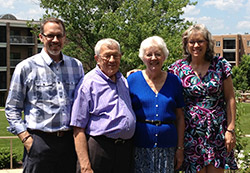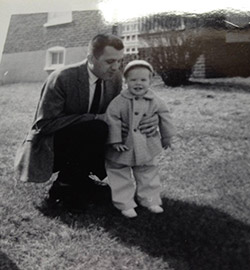Making of a man
I’ve worked hard all of my life. In high school, I worked in a library to earn money for college while studying hard to earn the grades that would get me into college. In college, I studied even harder, sometimes going weeks on end with only a few hours of sleep each night. It goes without saying that I worked hard in graduate school to earn good grades, while fighting a nearly debilitating lack of self-confidence, to get my Ph.D. I still work hard as I fight the daily frustrations of academic science, attempting to get funding, pushing to get my work published and still doing all that is expected of me as a professor.
Throughout my life, I have learned to rely on myself to achieve my goals. However, no matter how far I rise through the ranks of academic science and no matter where my path takes me in my job and in life, I never forget where I came from and who molded me and passed on to me the ideals and principles that shape my life.
I grew up in a very small town in Pennsylvania. Whenever I’m asked where I grew up I always say “just north of Philadelphia.” If pushed, then I’ll tell them … Perkasie. Even people familiar with the Upper Bucks County area of Pennsylvania have not heard of it. I reply: “Sellersville? Quakertown? Half way in between.”
Growing up in a small town gave me strong roots, roots that have stretched all the way to New Orleans and continue to feed me and strengthen me to this day.
I can take you back to my hometown and show you the house where I was born and where my parents still live after nearly 50 years. Then I can walk you up the street two blocks and show you where my grandfather and his 11 brothers and sisters were born; two houses up from there is where my great-grandfather was born, and four blocks later, where my father was born. On the way back, we can stop by Cemetery Hill, and I can show you where many of them rest. Then I can take you out to the farm country 15 minutes out of town and show you the church that my grandfather built, the church where my parents were married and where my sister and I were baptized and grew up, a church that used to be surrounded by fields (still is, mostly) and where on a warm spring day, with the windows wide open, the breeze would bring in that “fresh country air,” as we so fondly called the aroma wafting off of the fields freshly spread with manure.
 The author with his sister and parents on their 50th wedding anniversary (June 2013)
The author with his sister and parents on their 50th wedding anniversary (June 2013)
Growing up in a small town is not the only thing that helped to form my life-long ideals and principles. My family, in many, respects could be said to have lived the American Dream. One grandfather drove a truck; his wife worked in the school cafeteria. My other grandfather was a minister and his wife a minister’s wife. They worked hard, they saved their money, and they instilled strong family values and a solid work ethic in my parents and their brothers and sisters. Thanks to my grandparents’ hard work and support, my father and mother were able to go to college, earn their degrees as schoolteachers and provide a solid, stable home for my sister and me.
More importantly, my parents were always there for us: They pushed us when we needed to be pushed; they supported us when we needed to be supported, and they provided for us on a daily basis. They never imposed their wishes for our lives on us but instead allowed us to make our own decisions, and then encouraged us to work hard to achieve our goals. Doing less than our best was never an option; however, they knew that we worked hard, and when we didn’t quite live up to our own standards they knew that we had done the best we could possibly do. Because my grandparents (several of whom never finished high school) worked hard and instilled strong values in their children, my parents, who then passed these values onto my sister and myself, we were able to go on to become a professor at a university and a successful certified public accountant. Like I said, my family can be said to have fulfilled the American Dream.
 The author and his father (circa 1968)
The author and his father (circa 1968)
No matter how far I travel from home, I never will forget where it is that I come from. I take great pride in my Pennsylvania Dutch roots, the small area of Southeast Pennsylvania that was home to the Pennsylvania Germans (“Pennsylvania Deutsch” in German, a language my grandparents were raised speaking) and the strong family values and solid work ethic imbued by the German mentality. It always brings a smile to my face when I go home and see good German names like Lichtfuss, Fenstermacher, Kramer or Binsberger.
The town has grown since I left in 1989 to attend graduate school, but it still is, at heart, the town where I grew up. I was raised by a loving family in this town (including my aunts and uncles, great aunts and great uncles, and cousins) and I hold dear everything that they were and are as people. This family and that small Pennsylvania Dutch town are an integral part of my life that I carry with me no matter where I go, no matter what I do or who I become, and, because they were integral in shaping me as a person, I can never, nor would I want to ever, forget my roots and what made me the man I am today.
Enjoy reading 91��ɫ��ý Today?
Become a member to receive the print edition four times a year and the digital edition monthly.
Learn moreGet the latest from 91��ɫ��ý Today
Enter your email address, and we’ll send you a weekly email with recent articles, interviews and more.
Latest in Opinions
Opinions highlights or most popular articles

Sketching, scribbling and scicomm
Graduate student Ari Paiz describes how her love of science and art blend to make her an effective science communicator.

Embrace your neurodivergence and flourish in college
This guide offers practical advice on setting yourself up for success — learn how to leverage campus resources, work with professors and embrace your strengths.

Survival tools for a neurodivergent brain in academia
Working in academia is hard, and being neurodivergent makes it harder. Here are a few tools that may help, from a Ph.D. student with ADHD.

Hidden strengths of an autistic scientist
Navigating the world of scientific research as an autistic scientist comes with unique challenges —microaggressions, communication hurdles and the constant pressure to conform to social norms, postbaccalaureate student Taylor Stolberg writes.

Black excellence in biotech: Shaping the future of an industry
This Black History Month, we highlight the impact of DEI initiatives, trailblazing scientists and industry leaders working to create a more inclusive and scientific community. Discover how you can be part of the movement.

Attend 91��ɫ��ý’s career and education fair
Attending the 91��ɫ��ý career and education fair is a great way to explore new opportunities, make valuable connections and gain insights into potential career paths.

